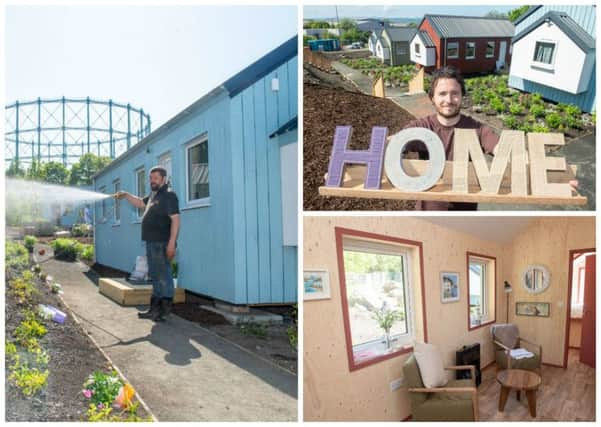In pictures: First look at Social Bite homeless village in Granton


Thousands of people have pledged their support to the innovative project designed to help the city’s most vulnerable people.
More than 8,000 participated in the world’s biggest sleep out which helped to raise more than £4 million – one of various events and campaigns that helped to fund the pioneering village. Meanwhile the generosity of businesses offering services and furnishings for the ten two-bedroom home development and community hub has more than halved the £750,000 cost of the village, based in Granton.
Advertisement
Hide AdAdvertisement
Hide AdJosh, founder of Social Bite, the charity behind the scheme, said: “It’s pretty amazing to see it all come to life. It looks better than I ever dreamt. It has a lovely atmosphere to it. It has a tranquil, safe feeling to it and hopefully when residents move in it will get even better.
“This simply wouldn’t have happened without the support. It would have cost more than double if it was not for the donations we’ve received.
“We’ve had individuals spending £30,000 to sponsor houses and more than 100 companies from the construction industry have offered pro bono support – everything from architecture to engineering, timber, bathrooms and windows. It’s been a phenomenal amount of support with people coming together and raising a voice for those who need it most.”
The ten two-bedroom home development will provide a safe living environment for up to 20 people from a homeless background for around 12 months at a time.
People living in unsupported temporary accommodation, shelters, hostels and B&Bs will be those who will move into the village and they will have a dedicated support team from Cyrenians to help them transition into permanent accommodation and employment.
The village’s community hub includes a communal kitchen, living space and a learning suite in order for residents to socialise, learn, train and eat together. The first six tenants are due to move in next month before phasing in new residents until the village reaches full capacity which is expected in September.
Kathy Hoyle, Social Bite village manager, said: “The village will be a great environment for community members to grow, learn and flourish in.
“It will be an opportunity for members to invest in a significant period of personal change that aims to grow their personal autonomy, build their social capacity and ultimately help break the cycle of welfare dependency, homelessness and associated traumas.
Advertisement
Hide AdAdvertisement
Hide Ad“We will have a fantastic team including ‘skilled key workers’ who will support members to address any issues which may have contributed to their homeless experience such as unemployment, relationships, social isolation, health and addictions.”
A health and wellbeing programme will help residents participate in various activities with a number of employers and community groups already pledging their support to the cause. The cost of the support will be provided by Social Bite for five full time staff members, a 24/7 waking support presence and part-time community builders. Talks with the city council are expected in the near future to create a sustainable funding model for the village.
Josh is determined for the project to succeed with Edinburgh currently in the midst of a housing and homeless crisis. Thousands of people are currently on the waiting list in order to get a permanent home.
The Evening News revealed in March that the city council had spent £16 million to house the homeless in temporary accommodation such as B&Bs and hostels in the past three years. Josh believes the village cannot do any worse than the existing models in place within the Capital.
He added: “People who are living here will otherwise be in a B&B, hostel or on the street. All of those are very isolated environments with practically no support. It is also very expensive for the city council with each of those people costing around £47 a month which all goes to private pockets.
“We physically cannot do worse than that and I’m positive this is a viable alternative that will work.”